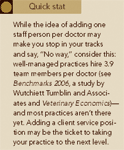Completing the circle of care
A special position dedicated to clients can be the mechanism that keeps your service machinery running flawlessly.
A typical day in a veterinary practice has ups and downs. On the up side, you may diagnose a difficult case or bring a patient back from the brink of death. On the down side, you may try your best to save a patient only to lose the battle and the life. That experience is humbling in a profession where compassion for pets guides every decision.
But nothing can bring you to your knees faster than the raging, distressed client who, in response to a bad outcome, accuses you or your team of being uncaring and demands his or her money back. It's heartbreaking. It's not even about money at this point, although you've most likely invested a lot in this pet's care. It's about the fact that you do care, but for some reason that compassion was not relayed to the client.

Even if you return the money, it won't change the way the client feels. He or she is likely upset about other issues. The money is just a tangible way to avenge a perceived injustice. And you're left wondering, where did it all go wrong?
Most of the time, a client's anger has nothing to do with how the case was handled medically. You can lose a pet no matter how hard you try, and clients will be satisfied if they feel you treated them right. On the other hand, you can make miracle saves all day long and still lose clients if they think they were treated poorly. The key is this: How well does your practice care for people? If no one takes responsibility for making sure each client feels well cared for, you may face all kinds of cranky pet owners—regardless of your skill and expertise. One solution: Hire that "someone" who focuses only on the client experience.
What do we call this team member?
A staff member who focuses solely on client care can be called many things: care coordinator, client advocate, or client service technician, for example. If your practice is an emergency or specialty hospital that depends on referrals from the veterinary community, you have another client base besides pet owners. In this case, you may call your team member a referral coordinator, public outreach coordinator, partner relations manager, or referring hospital liaison.

Getting client service to click
Regardless of the title, one thing must be clear: This person is responsible for cementing the relationship between clients and your practice.
What kind of person is right for the job?
It takes a special individual to excel in veterinary client service. He or she needs to possess a well-rounded complement of skills and knowledge. First and foremost, this person must have outstanding communication skills and perceptible compassion for people who own or refer pets.
A client service expert must also want to learn, because often the best candidates won't have a medical background. A client service expert needs to be able to communicate your expert medical care so clients understand it. This requires visible confidence, and that can't be faked. In other words, this person will need to develop true understanding of your medical care. Your service expert may not know it all, but she must be able to say with confidence, "I don't know; that's a great question. Let me find out for you." If clients sense a lack of confidence, they'll lose trust in your practice, and once that happens, it's difficult—if not impossible—to gain it back.
Where do I find the perfect person?
Your ideal client service expert might be right under your nose. It could be the receptionist who wants to advance into a broader role. Or the technician who's spent years honing her technical skills and now wants to pursue a new career path. Recruiting for this position takes a special knack, an ability to spot a great people person anywhere he or she might pop up.
The upside to promoting from within your hospital is that those candidates already possess a working knowledge of your practice protocols and flow. But you shouldn't overlook anyone with excellent communication skills and a desire to learn. Many perfect candidates exist outside the veterinary profession—for example, the waitress who's learned how to multitask and handle a stressful day and wants to move into the veterinary field. The right candidate will be fascinated by the big-picture view of patient care and eager to form relationships that transcend your clinic walls.
What will this person do every day?
A client service expert should be expected to handle any task that involves direct client contact. Let's walk through a typical day in her life.
She arrives in the morning, anxious to see the patients that stayed through the night and get a feel for any challenges the day will bring. She attends rounds with the doctor or obtains examination notes for all patients with updates on their status and treatment plan. In some cases, she enters all charges and generates daily financial updates for clients when she calls them with news about how their pets fared overnight. Ideally, if something has changed overnight or the pet will undergo a big procedure that day, the doctor will touch base with the client initially. But the client service expert coordinates the communication throughout the day, arranges visits and takes the pet to the exam room to see the family, offers further updates and answers questions as necessary, sends the pet home after recovery, and makes or answers calls once the pet is home.
For new incoming patients, the client service expert ensures that paperwork is completed, pertinent information is transferred to the doctor, and the appointment gets started without a hitch. During this initial contact, she begins to forge a relationship between the family and your practice. She presents a business card and formally introduces team members, explaining who each one is and the role he or she will play in the pet's care.
After the veterinarian examines the pet, the client service expert presents a financial estimate and obtains approval to proceed. She clearly explains the pet's treatment plan and sets client expectations about the communication they'll receive during the day.
When the hospitalized or newly admitted patient is ready to go home later that day, the client service expert finishes the invoice, gathers the medications or products, and reviews the home-care instructions with the client. She tops off the conversation, again, by explaining that she's the one to call if the client has questions or concerns. At the next visit, the client service expert will be familiar with the pet and family, and the relationship will grow even stronger.
Why do we need someone in this position?
You hire doctors for their medical expertise and hope they're "people people" as well. But people skills aren't necessarily the determining factor. Same goes for technicians. You try to find those who can relate to clients, but they're ultimately in this profession for the pets. And good thing they are, because we need expert nursing care for our patients. Receptionists need strong client service skills, but if they don't have the ability (or responsibility) to keep things flowing, organized, and up to date for every single client, they won't succeed in the position even if they can chitchat at the front desk.
That leaves this position: someone specifically responsible for client care. The most important contribution he or she provides is continuity for the client. The client knows two names and faces of people caring for her and her pet—the doctor and the client service expert. She doesn't have to explain to every different receptionist or technician the history of her pet and its care. She doesn't have to hear a new voice and name on the phone every time she calls with a problem. She has an accessible go-to person for every question or concern that comes up.
If you have a larger practice, you might need a team of people in this position—one for every doctor, or one for every two doctors at the most (see "Quick Stat"). Technicians, assistants, and receptionists need to be able to step in and perform these duties when necessary—and of course your entire team should be focused on client service at every step along the way—but practices that have created a position specifically for client service have been thrilled with the results.

Quick stat
What about at a specialty hospital?
At an emergency or specialty practice, the service expert's role is not only to care for pet owners but to strengthen the bond between the referring veterinarian and the receiving practice. So a major part of her duties is to expedite communication about mutual cases and ensure that the referring community receives targeted customer service. She may schedule referral appointments and relay information between the practices during an ongoing case. Together, the client, the referring veterinarian, and the receiving veterinarian form a continuum of care for the pet, and the client service expert is the glue that holds the circle together.
So what's the bottom line?
The client service expert is the conduit into your practice for all clients. She answers questions and takes and makes most phone calls, deflecting them from veterinarians who can in turn spend more time caring for patients. She knows, however, when to call in the doctor, such as when a referring veterinarian has medical questions or a client is concerned about a pet's troublesome condition.
The client service expert has a bird's-eye view of the pet's care. She understands why the pet came to your practice and what transpired during its stay. She is intimately familiar with the invoice charges, medications, procedures, and care instructions.
Most importantly, the client knows without a doubt that someone does care. And that's the bottom line. We all care for pets. But if we fail to translate that to pet owners, we have failed. No matter how large or small your practice, you can succeed by creating a position dedicated to caring for clients.
Katherine Dobbs, RVT, CVPM, is the hospital manager at Fox Valley Animal Referral Center in Appleton, Wis. Previously she worked as a client care coordinator for six years. Send questions or comments to ve@advanstar.com